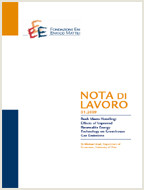Social Incentives Matter: Evidence from an Online Real Effort Experiment

08.01.2013
Mirco Tonin, Michael Vlassopoulos
D64, J24, J32, L3, M14, M52
Private Incentives, Social Incentives, Sorting, Prosocial Behavior, Real Effort Experiment, Corporate Social Responsibility, Gender
Economy and Society
Giuseppe Sammarco
Contributing to a social cause can be an important driver for workers in the public and non-profit sector as well as in firms that engage in Corporate Social Responsibility activities. This paper compares the effectiveness of social incentives – that take the form of a donation received by a charity of the subject’s choice – to financial incentives using an online real effort experiment. We find that social incentives lead to a 20% rise in productivity, regardless of their form (lump sum or related to performance) or strength. When subjects can choose the mix of incentives half sacrifice some of their private compensation to increase social compensation, with women more likely than men. Furthermore, social incentives do not attract less productive subjects, nor subjects that respond more to exogenously imposed social incentives. Our calculations suggest that in the context of our experiment a dollar spent on social incentives is equivalent to increasing private compensation by at least half a dollar.
